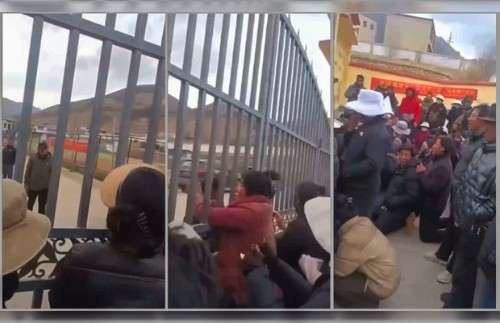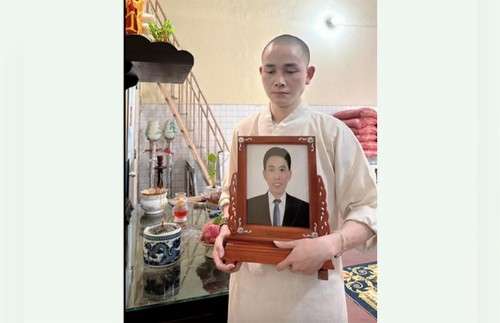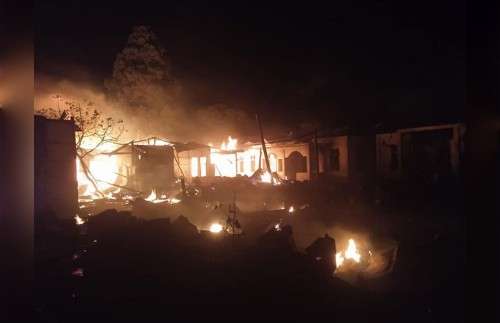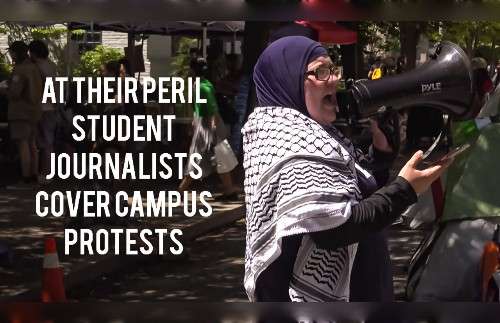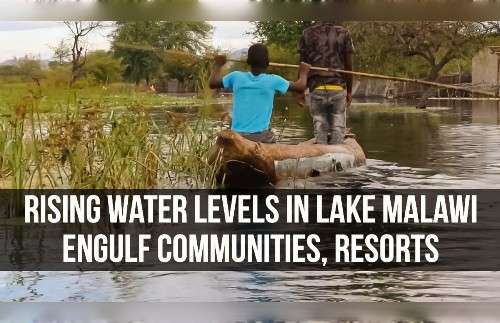Olena Smith and Oksana Shevchuk sell honey cakes to aid the relief effort back home.
By Cheryl Tung

The Ukrainian owners of an Eastern European restaurant in Hong Kong have started selling snacks and dishes from their hometowns to fund their country’s humanitarian efforts after the Russian invasion, they told RFA’s Cantonese Service. Sisters Olena Smith and Oksana Shevchuk have been selling Eastern European foods in the city since 2012, and started their restaurant, Dacha, in 2015, offering borsht, chicken Kiev, herring, kielbasa, blini with caviar and other delicacies from home to local diners. Russia’s invasion of Ukraine — where both women still have family and friends — left them feeling shattered, stranded and helpless. Smith and Shevchuk told RFA’s Cantonese Service how they came to be selling honey cakes to donate to the humanitarian aid effort back home, under the Cook For Ukraine project started by Ukrainian chef Olia Hercules and Russian food writer Alissa Timoshkina.
RFA: How are the people of Hong Kong responding to your project?
Smith: I was actually surprised by [people in Hong Kong] who are giving the money but do not need a cake — it’s just a donation. You know, they tried every way possible [to help]. Some order four cakes or five cakes for the week. So it’s very diverse … and every day we see more and more [of a] response [which has] overwhelming, which is beautiful. At the beginning, it was difficult emotionally, but we channeled the adrenaline rush … to actually do something … to help rather than suppress this emotion because those emotions are [running] very high.
RFA: As a Ukrainian, how are you feeling right now?
Shevchuk: We feel pain, tremendous pain, devastation. We felt fear at first because we don’t know what’s going to happen. Very big uncertainty for our family and friends. We don’t know if they are going to be safe today. Or maybe not safe tomorrow. So that kind of thing. Very basic safety concerns are number one.
RFA: How are your family and friends in Ukraine? Are they safe?
Shevchuk: It’s very unstable. Our cousin, she lives in Kyiv, but she managed to escape to [a town in] the Kyiv area. Now this town is bombed every day and she cannot leave it because she’s on the other side from where the green [humanitarian] corridor is. So they are out of food, out of electricity, out of water. So at this stage it is very like peak stress.
RFA: Can you keep in touch with them? Does the internet still work?
Shevchuk: They could be gone for two days and then come back online. But luckily, another cousin, she lives more or less in the safe area right now. So she can call her and then report back to us. So we still keep in close touch with our family back home. To be honest, it’s very short messages. For the first few days it was just crying. It was constantly — we couldn’t talk because they were full of fear; they never experienced this before. This is the first time ever they go through it as civilians being bombed. And that’s why at this stage, they kind of know that for us, it’s important that they stay online and let us know that they are okay, we can’t really sleep. These two weeks [have been] the hardest weeks of our life. For sure. It’s very hard to see those photos, I tell you. It’s extremely excruciating. It’s like you go through it yourself. That’s how we feel. You relive the moment and how much for them it would be shocking. I can’t imagine the pain [they are going] through right now. Of course we love our country … our people [are] really wonderful in their way. And Ukraine is very friendly country with, I would say, 8,000 years of history. And the river, lots of towns and cities with historical buildings, [that are] really beautiful and very old. Food, delicious food. Blue sky, rich memories. Sometimes it’s really beautiful, [blue] skies, lots of flowers, green trees, different trees. It’s a very green country … a beautiful country.

RFA: How did you start cooking for Ukraine?
Shevchuk: For the first few days we feel hopeless because we are here, and [there was] nothing we can do. Then … after a few days when the emotions just calmed down a little bit, we were thinking, okay since we are here, what we can do for our country and for [its] people? As you see in the news, many people are now in need, and we’ve been thinking about how we can help them … so we joined this project and really decided to act … and help by doing what we do best.
RFA: And what has the response been like?
Smith: Hong Kong has been just amazing these [past few] days. People find ways, their own ways, to house and support, some of them with very warm and nice words, some of them with money. Some Hong Kong people directly transfer funds to Red Cross Ukraine or UNICEF … any help counts. We just hope to raise more money so we can help more people.
RFA: Anything you want to say to Hongkongers?
Smith: First of all a massive, massive thank you. They come with anything from just words and messages to just being here, just to be around, everything counts. And we are very, very grateful.
RFA: How many people have been coming?
Smith: Hundreds of people … they come to say a few words of support and go, or they stay for lunch, or they buy a cake, whatever they do, but they come, and they come, and they come, so we’ve been extremely overwhelmed in a good way, about how humanity can come together … in very harsh circumstances. It feels feels really amazing that people can relate and can support us and can actually feel our pain and be so compassionate about the situation. We unite them under one umbrella as Eastern European, so for us we never felt like we have to say are you from Russia. We have done it on purpose [because] we want everyone to feel welcome because we share the same food and we want them to be united at the table. This was the idea behind [the restaurant]. Not all Russians support the invasion, and [some] actually feel sad and sorry on behalf of their country, which has nothing to do with them.
RFA: Can you tell us more about the restaurant?
Shevchuk: Dacha was opened seven years ago, with an idea of uniting the Eastern European community, like Ukrainian, Czech Republic, you name it, all Eastern European countries in one place at the table. Like a home away from home. So this was the idea behind the restaurant. Before the restaurant, we had an Eastern European shop, the first online shop in Hong Kong to supply … products from Eastern Europe like sausages or pickles, dairy products, we had more than 300 items in store. Then later on, we decided to open the restaurant.

RFA: You came to Hong Kong 16 years ago.
Shevchuk: Yes, Olena came in 2005. And I followed in 2008.
RFA: Why Hong Kong?
Shevchuk: We love to travel. And at that time we were very young, and we would travel with our friends, families, and just happened to be visiting Hong Kong … a couple times, actually and we … just decided to stay.
Smith: I met my husband in London, but he happened to be based in Hong Kong. And then I came to visit him a few times in Hong Kong. And he came to Ukraine a number of times. And then he proposed me and then I ended up in Hong Kong. But it was definitely a good choice because I love Hong Kong so much. It’s like a combination of everything in Hong Kong — it was a very cosmopolitan city.
RFA: So your parents live with you in Hong Kong?
Smith: Yeah, when they retired, they came here because I have two kids and they want to see them grow. And they just came and they started helping with the restaurant and to just be around the family. But after so many years living here, we already feel [that] Hong Kong is our home — our families are here, our business is here. Whenever we go, like, traveling to Europe, after one week, we feel like we want to go home [to Hong Kong].
RFA: What changes have you noticed in Hong Kong over the past 16 years?
Shevchuk: I think it has changed a bit, but we still live in kind of … in our bubble [with] our business. We work very hard here and we still see people come and go. This is the hardest part because it’s kind of hard to make friends. They come for three years for their contract and they leave. And that was the hardest struggle for us to to not have stable friends [who] will stay here for a long time. Definitely Hong Kong is very safe. I mean the kids just can go on the MTR even though my daughter is 12, she feels perfectly fine to go on her own. Incredible yet, a very big draw to stay in Hong Kong. I started with a dependent visa and then … he got a permanent ID. And I kind of got a work visa. And then [Oksana] also came on enough to get permanent ID. As for our parents, they are of retirement age, so once we got our permanent ID they could come and be here as a dependent. [We are] so grateful we can be together.

RFA: Olena, do you have kids too?
Smith: [I have] two children; my daughter is 12, and my son is two. They [were] born in Hong Kong. And it’s funny because my daughter said that she’s ‘not 50 percent Ukrainian and 50 percent Australian … because I’m born in Hong Kong.’ So she considers herself to come from here anyway. She considers Hong Kong as a part of her ‘no-identity identity.’ Because she grew up here, she was born here and she loves that she can … have her freedom and independence in some way. She always emphasizes … how beautiful Hong Kong is. We know that we still remain here. We’re still trying to adjust to whatever changes come, we just adjust and we continue doing our work and represent our country through food. [The] combination, the beautiful surroundings and the people who have been [our] customers. I feel like it’s not our homeland. But we were [made] so welcome here that it feels so warm and comforting. How could you not love it?
Translated and edited by Luisetta Mudie.
Copyright © 1998-2020, RFA. Used with the permission of Radio Free Asia, 2025 M St. NW, Suite 300, Washington DC 20036. https://www.rfa.org







